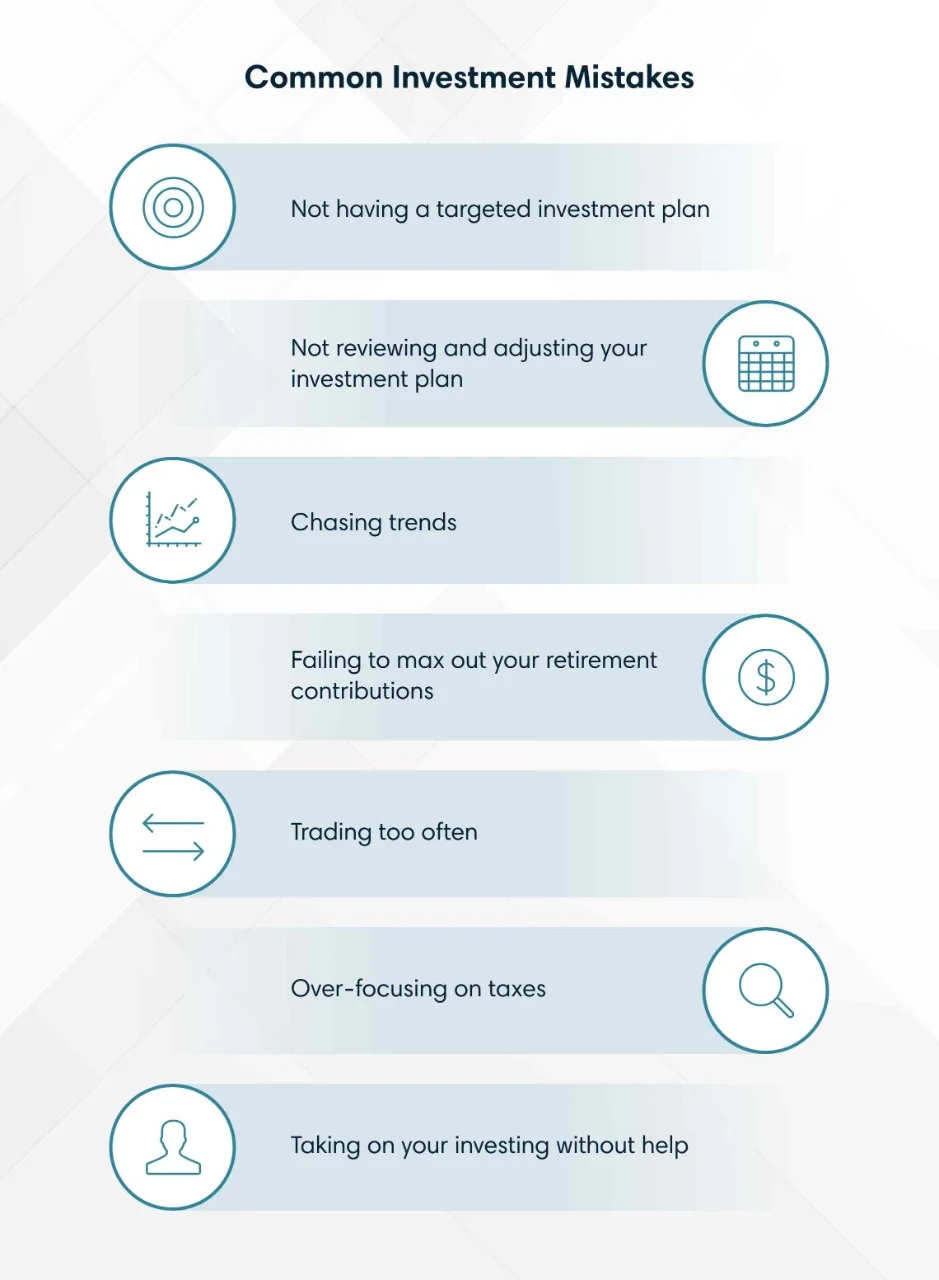Avoiding 7 common investment mistakes
Everyone wants to see their money grow and make the best use of it to reach their goals. But even the most financially savvy people can experience missteps along the way. What are common mistakes people make when they invest money? The answers might surprise you.

Knowing the most common investment mistakes can help you work with your financial professional to optimize your investment strategy—and make adjustments when necessary—to maximize your wealth.
Common investment mistakes
Here are some of the top mistakes to avoid when creating or implementing an investment plan.

Common investing mistakes include:
- Not having a targeted investment plan
- Not reviewing and adjusting your investment plan
- Chasing trends
- Failing to max out your retirement contributions
- Trading too often
- Overfocusing on taxes
- Taking on your investing without help
1Not having a targeted investment plan
If you started investing without a plan, it's not too late to put one in place. One investment strategy is to start with your financial goals and determine what types of investments can help you reach each of them. Whether it's retirement in two decades or a vacation abroad next year, each of your financial targets needs a plan and a timeline to help you prioritize the goal, assess your progress, balance your risk and make the necessary adjustments to stay on track. Without a plan, your progress is more likely to face challenges due to inappropriate investment moves or inaction—or both.
2Not reviewing and adjusting your investment plan
Even a sound investment plan may not be as sound in a few years as trends and market conditions change. Reviewing and adjusting your plan are both critical steps to keep you on pace to achieve your goals.
An annual review can help you identify when you might need to begin investing more, adjust your asset allocation or decrease your risk. A midyear review can also be helpful if your life has changed. It can offer the peace of mind that comes with knowing you're doing what's necessary to meet your goals.
3Chasing trends
When news headlines reference market volatility with large gains and days of significant losses, you might be tempted to try to time the market's fluctuations to take full advantage. Or if you see headlines on a company's venture into a new line of business, you may think it's a clue that their stock price is about to soar.
But chasing trends—positive or negative—comes with risks that could put your financial goals in jeopardy. If you find yourself concerned that you may be missing out, reach out to your financial advisor and discuss using some discretionary funds to make a small investment. If it pays off, great. If it doesn't, you won't lose significant progress toward your most important goals, like retirement. The important thing is to stick to your plan through varying market conditions.
4Failing to max out your retirement contributions
If you can afford to max out all of your retirement savings accounts without forcing negative consequences like having to go into debt to pay bills with your remaining income, it's a good option to consider. Be sure to pay close attention to your 401(k) to ensure that, at the minimum, you're getting the maximum match your company offers. Also don't forget about health savings accounts and other savings plans available.
If you're a business owner, consider setting up an employer-based plan, such as a SEP-IRA or Solo 401(k), to supplement your personal savings. Don't leave money on the table when it comes to your retirement.
5Trading too often
If you're trying to beat the market by constantly buying and selling, you might be losing money. Between commissions, account fees and thin margins on day trading-like activities, wins can quickly wash out once everything adds up. Additionally, only holding an investment for a short period of time before selling it may open you up to a larger capital gains tax rate.
A sound asset-allocation strategy and a diversified portfolio can help you invest for success without making you feel like you have to watch the market and time your trades.
6Overfocusing on taxes
Knowing the tax implications of your investments is an important part of a sound investing plan, but overfocusing on taxes is a common investment mistake. Be sure to discuss the option of tax-loss harvesting every year with your financial advisor and tax professional. This is a strategy that may help you offset any gains on investments you've sold during the year in order to decrease your capital gains tax obligations. Still, using taxes alone as a reason to make a trade could wind up costing you longer-term gains and hurting your goals.
7Investing without help
You take your car in for service and hire contractors to renovate your house, and the same logic applies here. Thinking you can do your investments entirely yourself could derail your goals. Building a financial team complete with a financial advisor and tax professional can help you save money and educate you on different types of investments and strategies.
Working closely with the expert guidance of a team of financial professionals could be the boost your overall investment plan needs to ease your worries and keep you headed toward your most important financial goals.





